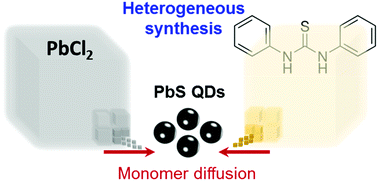Monodisperse and size-tunable PbS colloidal quantum dots via heterogeneous precursors†
Abstract
PbS quantum dots (QDs) are some of the most attractive QDs used to develop novel optoelectronic devices such as solar cells, photodetectors and biological labels. However, identifying an appropriate method to access high quality QDs with a wide size range employing lower cost, less toxic and safer precursors is not trivial. Here, we demonstrate the diffusion controlled synthesis of size-tunable PbS QDs by employing reactive N,N′-diphenylthiourea (DPTU) and PbCl2 precursors. The preparation of DPTU in 1-octadecene (ODE) and PbCl2 in oleylamine (OLA) provides turbid suspensions, ensuring that the reaction is in a diffusion controlled regime. The reaction of these reactive precursors provides access to smaller PbS QDs previously unattainable using an elemental sulfur precursor. Monodisperse QDs with a size range from 2.5 to 6 nm (corresponding to band gaps of 0.8–1.6 eV) were obtained at low to moderate growth temperatures of 30–150 °C. An optical study of the reaction kinetics suggests that the heterogeneous growth environment sufficiently delays the onset of Ostwald ripening, and QDs are air-stable over a range of sizes. The synthesized PbS QDs showed high photoluminescence quantum yields of 40–70% (depending on the QD size) with the extended photoluminescence lifetime reaching 2.2 μs.



 Please wait while we load your content...
Please wait while we load your content...